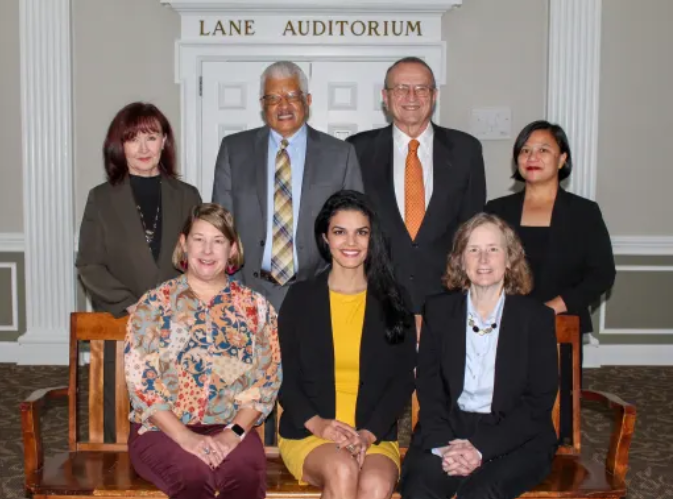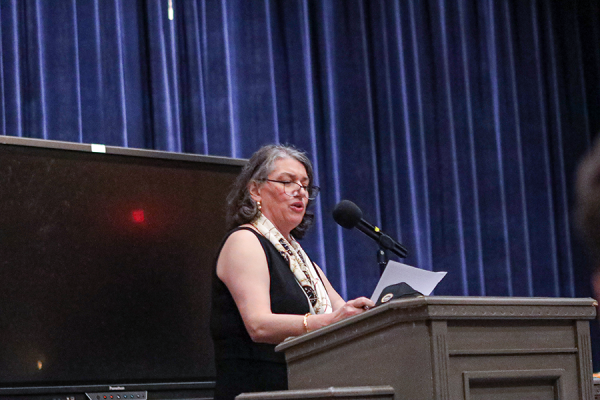Rebecca Berlin Joins Albemarle County School Board Mid-Term
Credit: Photo Courtesy of Albemarle County School Board
“The number one goal of schools is to educate the students who are the future of our country,” Berlin (front left) says.
June 5, 2023
When, after seven years on the Albemarle County School Board, David Oberg, who was famous for dressing in a chicken onesie at Crozet Elementary’s Walk and Bike to School Day, filed his resignation in October of 2022, there were some big, chicken-shaped shoes to be filled. Enter Rebecca Berlin: educator, researcher, parent, and self described “qualitative data person.”
Perhaps as a result of her chosen career paths, there is a certain duality to Berlin that is undeniably unique— her perspective is strongly rooted both in the data and the human context of any issue.
Berlin has been involved in education, in some form, throughout her entire career, but not always as a traditional classroom teacher. She began teaching in early childhood special education and went on to teach in inclusion classrooms and work as an autism specialist. She has worked for nonprofit and for-profit organizations. She has taught at UVA. She has worked on education policy at all levels of government. She has researched the impact of socio-emotional curriculum on children’s behavior. In terms of education, she has just about done it all. There lies that duality— Berlin is both an educator and researcher and she sees life, including the issues facing our school system, through both lenses.
Berlin herself sees this duality in the skills and knowledge she can now draw on in this new role. “As a researcher, I think it’s important to always look at the data,” she said. “It’s important to understand what the data says. But in my mind, it’s also important to say what the data doesn’t say. I’m more of a qualitative researcher than a quantitative researcher, so the data is very important. But it is also important to lift up student voices, because one of the things I have learned throughout my career is that as a white woman, as someone who was educated in public schools many, many years ago, what I think is needed is probably much different than what is actually needed today. The circumstances in the world are just very different from what I grew up with. I don’t know what it’s like to be as a student right now. I think it’s important to listen to that because we could make mistakes if we don’t listen to that,” she said.
Having raised her children in Albemarle County Public Schools, Berlin says that since the schools have done so much for her family, she felt like it was her “civic duty” to throw her hat into the ring to represent the White Hall Magisterial District. “I feel like having lived with two kids who survived a pandemic, and all the difficulties of it, and all the continuing problems of it, that I really needed to see if I could help support the schools,” Berlin said.
Berlin’s sense of civic duty was particularly propelled by the challenges that continue to face our school system in a “post-pandemic era.” “ I think a lot of people think the pandemic is ‘over’ and we’re gonna be able to turn around and in a year, we won’t have the same mental health challenges, we won’t have the same learning loss challenges,” she said. “But I really believe with the head of a researcher that we’re going to see the problems that the pandemic caused continue for many years to come.”
Berlin’s major priorities— closing the academic achievement gap, providing more mental health resources for students, and addressing issues with professional wellness and career satisfaction for school staff— all closely align with this ethos of addressing problems inflamed by the pandemic.
“What I see in all my work with kids is what the pandemic did to mental health, and that those issues were there before, but the pandemic definitely exacerbated them. We need to continue mental health support, for many years to come, and it’s not just going to be a one year, one size fits all solution,” she said.
On retention of staff in schools, Berlin says “Having been a teacher myself, I understand that the both the trauma, that the pandemic caused so many teachers, and how important it is to support their happiness and their well being, because that leads to better interactions with kids, but also to their retention.”
In the midst of national culture wars about race and how it is represented in school curricula and following a lawsuit filed against ACPS’ own Anti-Racism Policy, race has become a hot-button issue for school boards across the country, and that of Albemarle County is no exception. Berlin says that while, as a new representative, she is not necessarily familiar with the intricacies of the policy, she believes that its strength lies in the fact that it came from students and teachers, that “it didn’t come from top down, it came from from bottom up.”
As the understanding of diversity, equity, and inclusion curriculum evolves, Berlin is determined to ensure that “we continue to do that learning as a school board and as a school system.”
Whatever the issue may be, Berlin has a clear understanding of her job— that she works to serve students, parents, and staff, that “the number one goal of schools is to educate the students who are the future of our country.”















